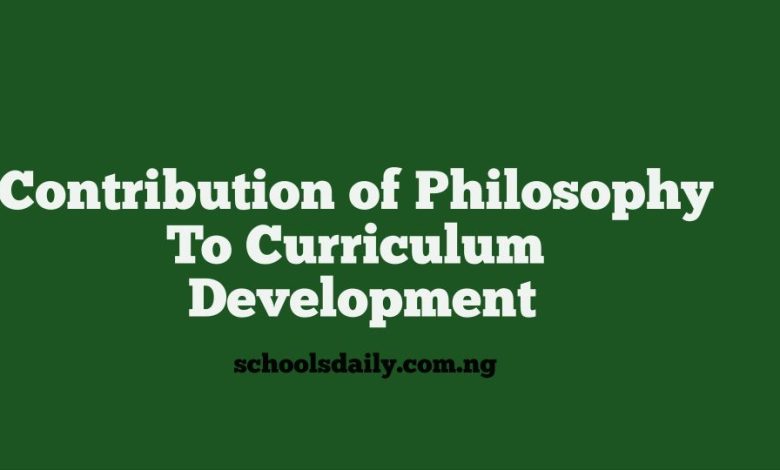Contribution of Philosophy To Curriculum Development

Philosophy plays a crucial role in shaping curriculum development by providing a framework for understanding the purpose and nature of education. Different philosophical perspectives offer varying views on what knowledge is valuable, how learning should occur, and the role of the teacher and student. These perspectives influence the selection of content, teaching methods, and assessment strategies. Some key philosophical influences on curriculum development include:
Idealism
Idealism is a philosophical approach that emphasizes the importance of ideas and abstract concepts in curriculum development. This perspective posits that the primary goal of education is to develop students’ intellectual skills and help them understand fundamental truths.
Key Tenets of Idealism in Curriculum Development
- Focus on Intellectual Development: Idealism prioritizes the development of students’ intellectual skills, such as critical thinking, problem-solving, and analytical reasoning.
- Emphasis on Abstract Concepts: Idealist curricula focus on abstract concepts, such as justice, morality, and beauty, to help students understand fundamental truths and universal principles.
- Development of Critical Thinking: Idealism encourages students to think critically and reflectively, analyzing ideas and concepts from multiple perspectives.
- Focus on the Individual: Idealist curricula prioritize the individual student’s intellectual and moral development, recognizing that each student has unique potential and abilities.
Implications for Curriculum Development
- Incorporating Abstract Concepts: Idealist curricula incorporate abstract concepts and ideas from various disciplines, such as philosophy, literature, and history.
- Emphasis on Critical Thinking and Analysis: Idealist curricula emphasize critical thinking and analysis, encouraging students to evaluate ideas and concepts critically.
- Development of Intellectual Skills: Idealist curricula prioritize the development of intellectual skills, such as problem-solving, analytical reasoning, and logical thinking.
- Focus on Moral and Ethical Development: Idealist curricula recognize the importance of moral and ethical development, incorporating values and principles that promote personal growth and social responsibility.
Examples of Idealist Curriculum Approaches
- Liberal Arts Education: A liberal arts education, which emphasizes the study of abstract concepts and ideas from various disciplines, is an example of an idealist curriculum approach.
- Philosophy-Based Curricula: Curricula that incorporate philosophical concepts and ideas, such as critical thinking, ethics, and logic, are also examples of idealist curriculum approaches.
- Interdisciplinary Studies: Interdisciplinary studies, which combine abstract concepts and ideas from multiple disciplines, are another example of idealist curriculum approaches.
Realism
Realism is a philosophical approach that emphasizes the importance of scientific knowledge and practical skills in curriculum development. This perspective posits that the primary goal of education is to prepare students for life in the real world by providing them with a solid foundation in scientific knowledge and practical skills.
Key Tenets of Realism in Curriculum Development
- Focus on Scientific Knowledge: Realism prioritizes the study of the natural world, emphasizing the importance of scientific knowledge and understanding.
- Emphasis on Practical Skills: Realist curricula focus on developing practical skills, such as problem-solving, critical thinking, and hands-on experimentation.
- Preparation for Life: Realism aims to prepare students for life in the real world, equipping them with the knowledge, skills, and attitudes necessary to succeed.
- Objectivity and Empiricism: Realist curricula emphasize objectivity and empiricism, encouraging students to rely on evidence-based reasoning and observation.
Implications for Curriculum Development
- Incorporating Scientific Methods: Realist curricula incorporate scientific methods, such as experimentation, observation, and data analysis.
- Emphasis on Problem-Solving: Realist curricula emphasize problem-solving and critical thinking, encouraging students to apply scientific knowledge to real-world problems.
- Development of Practical Skills: Realist curricula prioritize the development of practical skills, such as laboratory techniques, data analysis, and communication.
- Interdisciplinary Approaches: Realist curricula often incorporate interdisciplinary approaches, combining scientific knowledge with practical skills and real-world applications.
Examples of Realist Curriculum Approaches
- STEM Education: STEM education (science, technology, engineering, and mathematics) is an example of a realist curriculum approach, emphasizing scientific knowledge and practical skills.
- Project-Based Learning: Project-based learning, which involves hands-on experimentation and problem-solving, is another example of a realist curriculum approach.
- Vocational Training: Vocational training programs, which focus on developing practical skills for specific careers, are also examples of realist curriculum approaches.
Existentialism
Existentialism is a philosophical approach that emphasizes individual freedom and choice in curriculum development. This perspective posits that the primary goal of education is to encourage students to explore their own values and beliefs, develop their unique potential, and take responsibility for their choices.
Key Tenets of Existentialism in Curriculum Development
- lndividual Freedom and Choice: Existentialism prioritizes individual freedom and choice, recognizing that students must take responsibility for their own learning and decisions.
- Self-Discovery and Exploration: Existentialist curricula encourage students to explore their own values, beliefs, and interests, fostering self-awareness and autonomy.
- Development of Unique Potential: Existentialism aims to help students develop their unique potential, talents, and abilities, rather than conforming to predetermined standards or expectations.
- Emphasis on Personal Responsibility: Existentialist curricula emphasize personal responsibility, encouraging students to take ownership of their learning, choices, and actions.
Implications for Curriculum Development
- Student-Centered Learning: Existentialist curricula prioritize student-centered learning, recognizing that students are unique individuals with their own interests, needs, and goals.
- Flexible and Adaptive: Existentialist curricula are often flexible and adaptive, allowing students to explore different paths and make choices that align with their values and interests.
- Emphasis on Critical Thinking and Reflection: Existentialist curricula emphasize critical thinking and reflection, encouraging students to question assumptions, challenge norms, and think creatively.
- Focus on Personal Growth and Development: Existentialist curricula prioritize personal growth and development, recognizing that education is a lifelong process that extends beyond formal schooling.
Examples of Existentialist Curriculum Approaches
- Personalized Learning Plans: Personalized learning plans, which allow students to set their own goals and objectives, are an example of an existentialist curriculum approach.
- Project-Based Learning: Project-based learning, which encourages students to explore real-world problems and develop innovative solutions, is another example of an existentialist curriculum approach.
- Self-Directed Learning: Self-directed learning programs, which allow students to take ownership of their learning and make choices about their curriculum, are also examples of existentialist curriculum approaches.
Pragmatism
Pragmatism is a philosophical approach that emphasizes the importance of experience and action in curriculum development. This perspective posits that the primary goal of education is to prepare students for real-world challenges by focusing on solving practical problems and developing useful skills.
Key Tenets of Pragmatism in Curriculum Development
- Emphasis on Experience: Pragmatism prioritizes hands-on experience and experimentation, recognizing that learning is most effective when it is grounded in real-world applications.
- Focus on Problem-Solving: Pragmatist curricula focus on solving real-world problems, encouraging students to think critically and develop practical solutions.
- Development of Practical Skills: Pragmatism emphasizes the development of practical skills, such as communication, collaboration, and critical thinking.
- Emphasis on Action: Pragmatist curricula encourage students to take action, applying what they have learned to real-world situations.
Implications for Curriculum Development
- Project-Based Learning: Pragmatist curricula often incorporate project-based learning, where students work on real-world projects that require problem-solving and critical thinking.
- Experiential Learning: Pragmatist curricula prioritize experiential learning, providing students with opportunities for hands-on experience and experimentation.
- Collaboration and Community Engagement: Pragmatist curricula often involve collaboration with community partners, providing students with opportunities for real-world application and community engagement.
- Assessment of Practical Skills: Pragmatist curricula emphasize the assessment of practical skills, such as problem-solving, communication, and critical thinking.
Examples of Pragmatist Curriculum Approaches
- Service-Learning Programs: Service-learning programs, which combine community service with academic learning, are an example of a pragmatist curriculum approach.
- Project-Based Learning: Project-based learning programs, which focus on real-world projects and problem-solving, are another example of a pragmatist curriculum approach.
- Vocational Training: Vocational training programs, which focus on developing practical skills for specific careers, are also an example of a pragmatist curriculum approach.
Progressivism
Progressivism is a philosophical approach that emphasizes the importance of social reform and individual growth in curriculum development. This perspective posits that the primary goal of education is to prepare students to be active participants in a democratic society, capable of thinking critically and addressing social issues.
Tenets of Progressivism in Curriculum Development
- Emphasis on Social Reform: Progressivism prioritizes social reform, recognizing that education can play a key role in addressing social issues and promoting positive change.
- Focus on Individual Growth: Progressivist curricula focus on individual growth, emphasizing the development of critical thinking, problem-solving, and creativity.
- Flexible and Responsive Curriculum: Progressivism advocates for a flexible and responsive curriculum, one that is adapted to the needs of students and society.
- Student-Centered Learning: Progressivist curricula prioritize student-centered learning, recognizing that students should be active participants in the learning process.
Implications for Curriculum Development
- Inquiry-Based Learning: Progressivist curricula often incorporate inquiry-based learning, where students explore real-world issues and develop solutions.
- Project-Based Learning: Progressivist curricula may also incorporate project-based learning, where students work on extended projects that promote critical thinking and problem-solving.
- Community Engagement: Progressivist curricula often involve community engagement, providing students with opportunities to apply what they have learned to real-world situations.
- Ongoing Assessment and Evaluation: Progressivist curricula emphasize ongoing assessment and evaluation, recognizing that the curriculum should be continuously adapted to meet the needs of students and society.
Examples of Progressivist Curriculum Approaches
- Social Justice Education: Social justice education programs, which focus on addressing issues of inequality and promoting social change, are an example of a progressivist curriculum approach.
- Environmental Education: Environmental education programs, which focus on promoting sustainability and addressing environmental issues, are another example of a progressivist curriculum approach.
- Service-Learning Programs_l: Service-learning programs, which combine community service with academic learning, are also an example of a progressivist curriculum approach.
By understanding these different philosophical perspectives, educators can make informed decisions about the curriculum and create learning experiences that are meaningful and effective.




